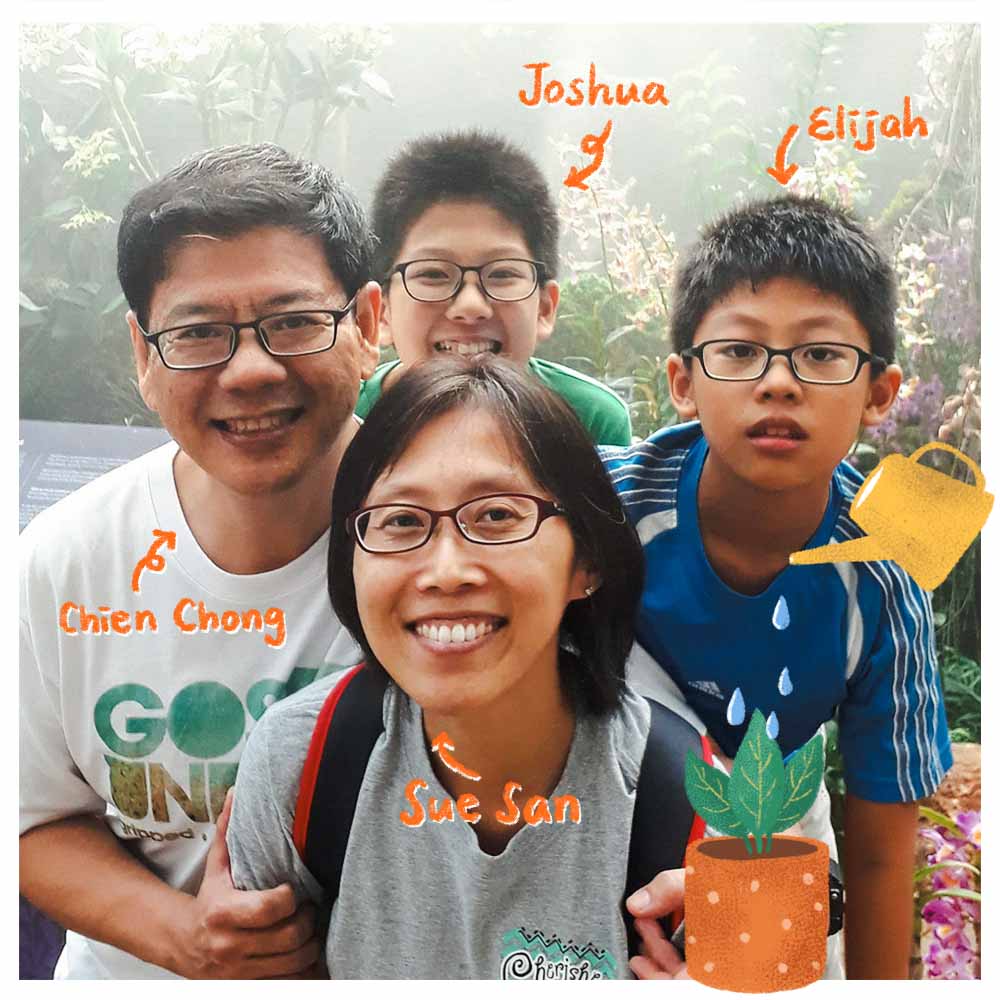
Whenever either of his two sons behaves badly or throws a tantrum, Lim Chien Chong’s first response is to reflect on his own behaviour.
“One of my first thoughts is, ‘Oh, no, maybe that’s how I behave too, and my son’s just mirroring my response to the situation,’” says the Teaching & Resource Director of Singapore Youth For Christ.
“Besides just thinking about what I should tell him, I also ask myself, ‘Do I do that too?’ Perhaps the Lord is using my child to highlight something about myself.”
This is one of the biggest lessons that Chien Chong and his wife Sue San have learnt about parenting their two sons, Joshua and Elijah. He calls it “growing with our children”—essentially, growing in maturity alongside their kids.
In Hebrews 5:12, the author reprimands his hearers for their immaturity, saying, “You need milk, not solid food!” This rebuke is directed at everyone, not just kids.
He continues: “Anyone who lives on milk, being still an infant, is not acquainted with the teaching about righteousness. But solid food is for the mature, who by constant use have trained themselves to distinguish good from evil (vv. 13–14).”
We can forget that the growing-up journey is for both parents and kids—that as we ‘grow’ our kids, we are also growing up ourselves.”
These verses remind us, says Chien Chong, that whether parents or children, we all have a lot of growing up to do, especially in learning about righteousness.
“In the early years, my focus was on making my children grow up in different areas, such as being more responsible and less temperamental,” he says.
“But the Lord reminded me that I have as much growing up to do in these areas. We can forget that the growing-up journey is for both parents and kids—that as we ‘grow’ our kids, we are also growing up ourselves.”
“How Am I as a Dad?”
Every now and then, Chien Chong asks his sons, “How am I faring as a father? If 0 is ‘terrible’ and 10 is ‘great’, where would you put Daddy?”
Once, he suggested that maybe he was a ‘6’ but his son replied cheekily, “No, Dad, you are maybe . . . a 7.”
Chien Chong quickly asked, “So, what’s missing?” And that’s when his sons told him that he hadn’t been paying enough attention to them after returning from work each day, and hadn’t been listening enough to them because he was more intent on catching his afternoon nap.
Such feedback, says Chien Chong, not only makes him more conscious about balancing work, leisure, and family, but also reminds him to monitor his own progress on his journey with God.
“Sometimes I can be critical about my children’s character, conduct, or spiritual walk, and keep nagging and reminding them to buck up. But I might not be addressing those same issues in my own life,” he explains. “To grow up with our kids is to ask, ‘Have I also been displaying a lack of perseverance? Perhaps that’s why my kids have picked it up.’”
For him, Matthew 7:2–3 is a key principle: “For in the same way as you judge others, you will be judged, and with the measure you use, it will be measured to you. Why do you look at the speck of sawdust in your brother’s eye and pay no attention to the plank in your own eye?”
“To grow up with our kids is to ask, ‘Have I also been displaying a lack of perseverance? Perhaps that’s why my kids have picked it up.’”

Chien Chong and Sue San with their boys, Joshua and Elijah
Being Consistent and Authentic
The constant introspection and self-reflection has not only helped Chien Chong and Sue San in their quest to become better parents, but also introduced more of these crucial items in their lives: consistency, authenticity, and humility.
Like many other parents, the father of two stresses that children are always watching—and learning—from their parents’ behaviour. They will not only spot hypocrisy, he says, but also pick up on how their parents relate and grow spiritually themselves.
And though it can be very difficult for parents to be consistent in their behaviour, if they make the effort and are honest about their own failures, says Chien Chong, they will bring an authenticity to their lives that their children will appreciate.
“The more real we are, the more receptive they will be to us,” he says. “They will see the sincerity in us.”
If parents make the effort and are honest about their own failures, they will bring an authenticity to their lives that their children will appreciate.
Being Humble
Constantly reflecting on his own behaviour and asking for feedback from his sons on his “performance” has also taught Chien Chong to stay humble.
Realising that he sometimes fails to meet the standards he teaches, for example, reminds him that he is far from perfect. “That’s when I realise I’m not as patient as I think I am, nor as great a father as I think I am,” he says.
Humility also comes from being accountable for his actions in front of his children.
Sometimes, he says, he will walk away from a dispute with his sons because he’s too upset and doesn’t want to say something he will regret.
But his sons have picked up the habit, walking away when they lose a game, for example.
“So I asked myself, ‘Is there a better way to walk away?’ I need to explain to my sons the reasoning behind my action. I may have walked away to avoid blurting out hurtful words, but I still need to revisit the issue with them in humility.”
Adds Chien Chong: “As people who are being transformed by Jesus, we should all be walking as ‘children of light’. It means that all of us must always embrace, live, and grow ‘in all goodness, righteousness and truth . . . and find out what pleases the Lord’” (Ephesians 5:9-10).
A Lesson about Ourselves
Learning to “grow with my children” has taught Chien Chong as much about himself as it has about parenting.
Among other things, he has learnt to be slower in judging others, to be more attentive and responsive to what others might be thinking, and to look out for his own failures and faults so that he can act on them.
In turn, that has heightened his awareness of the principles in God’s Word and of how God works through issues with His children.
It has also given him a precious glimpse of God’s heart as a Father. “I’m understanding more of what it means to be God’s child, and of Him as my perfect Father,” he says.
“When I observe my children, I’m reminded of where I have failed as a son to my own parents, and how I can learn to trust and obey God more. And as I observe myself as a father, I’ve become more appreciative of God as my Father.”
At the same time, there’s a comforting flip side to trying to “grow with your children”: it means that parents can take a wider perspective of parenting, and remember that being a parent is just one aspect of their lifelong journey with the Lord.
“Raising our children is not our only life goal,” he declares. Just as all Christians can expect to struggle and stumble in their journey towards Christlikeness, they need not fret when they stumble and fail as parents.
And, Chien Chong adds, they can take heart in the knowledge that they can keep turning to God for strength and help.
“Parenting is a challenging journey, as with all other journeys,” he says. “But it’s also a joyful one. Press on, don’t give up, and for now, don’t think about whether you are getting there yet. Just enjoy the journey with your spouse and your children—they are a blessing.”
“When I observe my children, I’m reminded of where I have failed as a son to my own parents, and how I can learn to trust and obey God more. And as I observe myself as a father, I’ve become more appreciative of God as my Father.”
Chien Chong’s Tips for Growing with Your Children
- Never think that we are doing okay as parents and followers of Christ.
- Be consistent, authentic, and humble.
- Remember: raising children is not your only goal in life.
- Depend on the Lord to help you.
- Enjoy your spouse and children—they are God’s blessing.
- Don’t give up trying and don’t give up praying.



